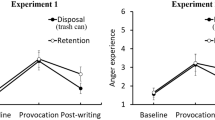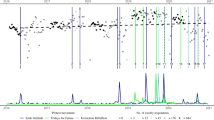Abstract
Social norms and the associated altruistic behaviours are decisive for the evolution of human cooperation1,2,3,4,5,6,7,8,9 and the maintenance of social order10, and they affect family life, politics11 and economic interactions12. However, as altruistic norm compliance and norm enforcement often emerge in the context of inter-group conflicts13,14, they are likely to be shaped by parochialism15—a preference for favouring the members of one's ethnic, racial or language group. We have conducted punishment experiments16, which allow ‘impartial’ observers to punish norm violators, with indigenous groups in Papua New Guinea. Here we show that these experiments confirm the prediction of parochialism. We found that punishers protect ingroup victims—who suffer from a norm violation—much more than they do outgroup victims, regardless of the norm violator's group affiliation. Norm violators also expect that punishers will be lenient if the latter belong to their social group. As a consequence, norm violations occur more often if the punisher and the norm violator belong to the same group. Our results are puzzling for evolutionary multi-level selection theories based on selective group extinction2,3,4,5 as well as for theories of individual selection17,18,19; they also indicate the need to explicitly examine the interactions between individuals stemming from different groups in evolutionary models.
This is a preview of subscription content, access via your institution
Access options
Subscribe to this journal
Receive 51 print issues and online access
$199.00 per year
only $3.90 per issue
Buy this article
- Purchase on Springer Link
- Instant access to full article PDF
Prices may be subject to local taxes which are calculated during checkout



Similar content being viewed by others
References
Sober, E. & Wilson, D. S. Unto Others—The Evolution and Psychology of Unselfish Behavior (Harvard Univ. Press, Cambridge, Massachusetts, 1998)
Gintis, H. Strong reciprocity and human sociality. J. Theor. Biol. 206, 169–179 (2000)
Henrich, J. & Boyd, R. Why people punish defectors–weak conformist transmission can stabilize costly enforcement of norms in cooperative dilemmas. J. Theor. Biol. 208, 79–89 (2001)
Boyd, R., Gintis, H., Bowles, S. & Richerson, P. J. The evolution of altruistic punishment. Proc. Natl Acad. Sci. USA 100, 3531–3535 (2003)
Bowles, S., Choi, J.-K. & Astrid, H. The coevolution of individual behaviors and group level institutions. J. Theor. Biol. 223, 135–147 (2003)
Sigmund, K., Hauert, C. & Nowak, M. A. Reward and punishment. Proc. Natl Acad. Sci. USA 98, 10757–10762 (2001)
Fehr, E. & Gächter, S. Altruistic punishment in humans. Nature 415, 137–140 (2002)
Milinski, M., Semmann, D. & Krambeck, H. J. Reputation helps solve the ‘tragedy of the commons’. Nature 415, 424–426 (2002)
Nowak, M. A. & Sigmund, K. Evolution of indirect reciprocity. Nature 437, 1291–1298 (2005)
Elster, J. The Cement of Society—A Study of Social Order (Cambridge Univ. Press, Cambridge, UK, 1989)
Lindbeck, A., Nyberg, S. & Weibull, J. W. Social norms and economic incentives in the welfare state. Q. J. Econ. 114, 1–35 (1999)
Stutzer, A. & Lalive, R. The role of social work norms in job searching and subjective well-being. J. Eur. Econ. Assoc. 2, 696–719 (2004)
Otterbein, K. F. The Evolution of War: A Cross-Cultural Study (Human Relations Area Files Press, New Haven, 1985)
Bornstein, G. Intergroup conflict: Individual, group, and collective interests. Pers. Soc. Psychol. Rev. 7, 129–145 (2003)
Bowles, S. & Choi, J.-K. in Cultural Diversity versus Economic Solidarity (ed. Parijs, P. V.) 81–97 (Franqui Scientific Library, Brussels, 2004)
Fehr, E. & Fischbacher, U. Third-party punishment and social norms. Evol. Hum. Behav. 25, 63–87 (2004)
Hamilton, W. D. Genetical evolution of social behaviour I & II. J. Theor. Biol. 7, 1–25, 26–52 (1964)
Trivers, R. L. Evolution of reciprocal altruism. Q. Rev. Biol. 46, 35–57 (1971)
Nowak, M. A. & Sigmund, K. Evolution of indirect reciprocity by image scoring. Nature 393, 573–577 (1998)
Fehr, E. & Fischbacher, U. The nature of human altruism. Nature 425, 785–791 (2003)
Kaplan, H. & Gurven, M. in Moral Sentiments and Material Interests—The Foundations of Cooperation in Economic Life (eds Gintis, H., Bowles, S. & Boyd, R.) 75–113 (MIT Press, Cambridge, Massachusetts, 2005)
Boehm, C. Egalitarian behavior and reverse dominance hierarchy. Curr. Anthropol. 34, 227–254 (1993)
Wiessner, P. Norm enforcement among the Ju/'hoansi bushmen: A case of strong reciprocity? Hum. Nat. 16, 115–145 (2005)
Henrich, J. et al. In search of homo economicus: behavioural experiments in 15 small-scale societies. Am. Econ. Rev. 91, 73–78 (2001)
Shinada, M., Yamagishi, T. & Ohmura, Y. False friends are worse than bitter enemies: “Altruistic” punishment of in-group members. Evol. Hum. Behav. 25, 379–393 (2004)
Tajfel, H., Billig, M., Bundy, R. & Flament, C. Social categorization in intergroup behaviour. Eur. J. Soc. Psychol. 1, 149–178 (1971)
Brewer, M. In-group bias in the minimal intergroup situation: A cognitive-motivational analysis. Psychol. Bull. 86, 307–324 (1979)
Rabbie, J. M., Schot, J. C. & Visser, L. Social identity theory: A conceptual and empirical critique from the perspective of a behavioural interaction model. Eur. J. Soc. Psychol. 19, 171–202 (1989)
Yamagishi, T., Jin, N. & Kiyonari, T. in Advances in Group Processes (eds Thye, S. R., Lawler, E. J., Macy, M. W. & Walker, H. A.) 161–197 (JAI Press, Stamford, 1999)
Kaplan, H. & Hill, K. Food Sharing among Ache foragers: Tests of explanatory hypotheses. Curr. Anthropol. 26, 223–246 (1985)
Wiessner, P. & Tumu, A. Historical Vines: Enga Networks of Exchange, Ritual, and Warfare in Papua New Guinea (Smithsonian Institution Press, Washington DC, 1998)
Henrich, J et al. Costly punishment across human societies. Science (in the press)
Acknowledgements
This paper is part of the Research Priority Program ‘Foundations of Human Social Behaviour–Altruism versus Egoism’ at the University of Zurich. Financial support from the MacArthur Foundation (Network on Economic Environments and the Evolution of Individual Preferences and Social Norms) and the Cogito Foundation is also acknowledged.
Author information
Authors and Affiliations
Corresponding authors
Ethics declarations
Competing interests
Reprints and permissions information is available at www.nature.com/reprints. The authors declare no competing financial interests.
Supplementary information
Supplementary Notes
This file contains supplementary information, including Supplementary Figures 1–3, Supplementary Table 1, Supplementary Methods and six references. (PDF 309 kb)
Rights and permissions
About this article
Cite this article
Bernhard, H., Fischbacher, U. & Fehr, E. Parochial altruism in humans. Nature 442, 912–915 (2006). https://doi.org/10.1038/nature04981
Received:
Accepted:
Issue Date:
DOI: https://doi.org/10.1038/nature04981
This article is cited by
-
Altruistic punishment in intergroup context
Current Psychology (2024)
-
Measuring National Parochialism and Explaining Its Individual Variations Using Survey Data
Social Indicators Research (2024)
-
Prosocial behavior in competitive fish: the case of the archerfish
Communications Biology (2023)
-
Discriminatory punishment undermines the enforcement of group cooperation
Scientific Reports (2023)
-
Attacking the Weak or the Strong? An Experiment on the Targets of Parochial Altruism
Political Behavior (2023)
Comments
By submitting a comment you agree to abide by our Terms and Community Guidelines. If you find something abusive or that does not comply with our terms or guidelines please flag it as inappropriate.



